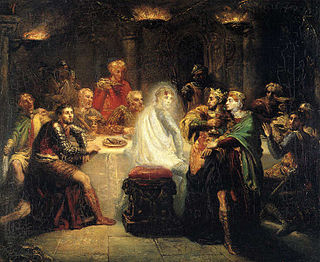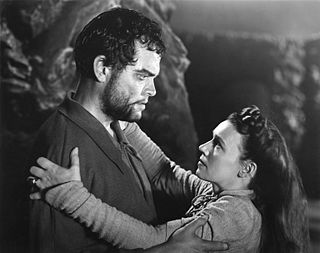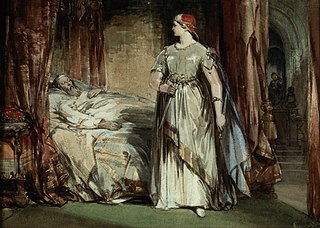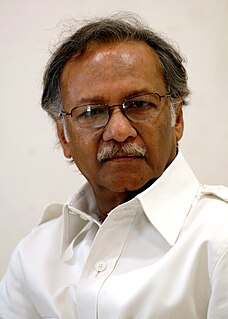Related Research Articles

Lord Banquo, the Thane of Lochaber, is a character in William Shakespeare's 1606 play Macbeth. In the play, he is at first an ally of Macbeth and they meet the Three Witches together. After prophesying that Macbeth will become king, the witches tell Banquo that he will not be king himself, but that his descendants will be. Later, Macbeth in his lust for power sees Banquo as a threat and has him murdered by three hired assassins; Banquo's son, Fleance, escapes. Banquo's ghost returns in a later scene, causing Macbeth to react with alarm during a public feast.

Macbeth is a tragedy by William Shakespeare; it is thought to have been first performed in 1606. It dramatises the damaging physical and psychological effects of political ambition on those who seek power for its own sake. Of all the plays that Shakespeare wrote during the reign of James I, who was patron of Shakespeare's acting company, Macbeth most clearly reflects the playwright's relationship with his sovereign. It was first published in the Folio of 1623, possibly from a prompt book, and is Shakespeare's shortest tragedy.

Macbeth was King of Scots from 1040 until his death. He ruled over a portion of present-day Scotland.

Jonathan Pryce is a Welsh actor. After studying at the Royal Academy of Dramatic Art, he began his career as a stage actor in the early 1970s. His work in theatre includes an Olivier Award-winning performance in the title role of the Royal Court Theatre's Hamlet. On the Broadway stage he earned Tony Awards—the first for Best Featured Actor in a Play for his Broadway debut role in Comedians (1977), the second for Best Actor in a Musical for his role as The Engineer in the musical Miss Saigon (1991).

Donnchad mac Crinain was king of Scotland (Alba) from 1034 to 1040. He is the historical basis of the "King Duncan" in Shakespeare's play Macbeth.

The Royal Shakespeare Company (RSC) is a major British theatre company, based in Stratford-upon-Avon, Warwickshire, England. The company employs over 1,000 staff and produces around 20 productions a year. The RSC plays regularly in London, Stratford-upon-Avon, and on tour across the UK and internationally.
Sir Trevor Robert Nunn is a British theatre director. Nunn has been the Artistic Director for the Royal Shakespeare Company, the Royal National Theatre, and, currently, the Theatre Royal, Haymarket. He has directed dramas for the stage, like Macbeth, as well as opera and musicals, such as Cats (1981) and Les Misérables (1985).

Lord Macduff, the Thane of Fife, is a character in William Shakespeare's Macbeth (c.1603–1607) that is loosely based on history. Macduff, a legendary hero, plays a pivotal role in the play: he suspects Macbeth of regicide and eventually kills Macbeth in the final act. He can be seen as the avenging hero who helps save Scotland from Macbeth's tyranny in the play.

Macbeth is a 1971 historical drama film directed by Roman Polanski and co-written by Polanski and Kenneth Tynan. A film adaptation of William Shakespeare's tragedy of the same name, it tells the story of the Highland lord who becomes King of Scotland through treachery and murder. The film stars Jon Finch as the title character and Francesca Annis as Lady Macbeth, noted for their relative youth as actors. Themes of historic recurrence, greater pessimism and internal ugliness in physically beautiful characters are added to Shakespeare's story of moral decline, which is presented in a more realistic style.
Fleance is a figure in legendary Scottish history. He was depicted by 16th-century historians as the son of Lord Banquo, Thane of Lochaber, and the ancestor of the kings of the House of Stuart. Fleance is best known as a character in William Shakespeare's play Macbeth, in which the Three Witches prophecy that Banquo's descendants shall be kings. Some screen adaptations of the story expand on Fleance's role by showing his return to the kingdom after Macbeth's death.

Lord Macbeth, the Thane of Glamis and quickly the Thane of Cawdor, is the title character and main protagonist in William Shakespeare's Macbeth. The character is loosely based on the historical king Macbeth of Scotland and is derived largely from the account in Holinshed's Chronicles (1577), a compilation of British history.

Holinshed's Chronicles, also known as Holinshed's Chronicles of England, Scotland, and Ireland, is a collaborative work published in several volumes and two editions, the first edition in 1577, and the second in 1587. It was a large, comprehensive description of British history published in three volumes.

The Three Witches, also known as the Weird Sisters or Wayward Sisters, are characters in William Shakespeare's play Macbeth. The witches eventually lead Macbeth to his demise, and hold a striking resemblance to the three Fates of classical mythology. Their origin lies in Holinshed's Chronicles (1587), a history of England, Scotland and Ireland. Other possible sources, aside from Shakespear, include British folklore, contemporary treatises on witchcraft as King James VI of Scotland's Daemonologie, the Norns of Norse mythology, and ancient classical myths of the Fates: the Greek Moirai and the Roman Parcae.

King Duncan is a fictional character in Shakespeare's Macbeth. He is the father of two youthful sons, and the victim of a well-plotted regicide in a power grab by his trusted captain Macbeth. The origin of the character lies in a narrative of the historical Donnchad mac Crinain, King of Scots, in Raphael Holinshed's 1587 The Chronicles of England, Scotland, and Ireland, a history of Britain familiar to Shakespeare and his contemporaries. Unlike Holinshed's incompetent King Duncan, Shakespeare's King Duncan is crafted as a sensitive, insightful, and generous father-figure whose murder grieves Scotland and is accounted the cause of turmoil in the natural world.

Donalbain is a character in William Shakespeare's Macbeth. He is the younger son of King Duncan and brother to Malcolm, the heir to the throne. Donalbain flees to Ireland after the murder of his father for refuge.
Dunsinane is a 2010 play by David Greig. It premiered in a Royal Shakespeare Company production at the Hampstead Theatre from 10 February to 6 March 2010, directed by RSC Associate Director Roxana Silbert and with leads including Siobhan Redmond and Jonny Phillips.
Malcolm is a character in William Shakespeare's Macbeth. The character is based on the historical king Malcolm III of Scotland, and is derived largely from the account in Holinshed's Chronicles (1587), a history of Britain. He is the elder son of King Duncan, the heir to the throne, and brother to Donalbain. In the end, he regains the throne after mustering support to overthrow Macbeth.

Sitanshu Yashaschandra Mehta, better known as Sitanshu Yashaschandra, is a Gujarati language poet, playwright, translator and academic from India.

Raj Bisaria is an Indian director, producer, actor and educationalist, described by the Press Trust of India as "the father of the modern theatre in North India". He founded Theatre Arts Workshop in 1966, and Bhartendu Academy of Dramatic Arts in 1975 and the repertory company of Bhartendu Academy of Dramatic Arts in 1980. He has blended artistic concepts of the East and the West, and the traditional and the modern.

The tragic play Macbeth by William Shakespeare have appeared and been reinterpreted in many forms of art and culture since it was written in the early 17th century.
References
- ↑ Billington 2007.
- ↑ Curtiss 1972.
- ↑ Smith 2003, pp. 77–78.